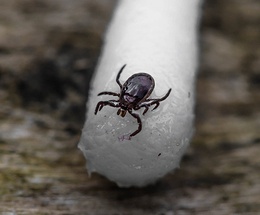It’s been reported in the news that the 2017 tick season is going to be worse than usual. If you’re wondering why they’re anticipating such a bad season, there’s some supporting evidence.
This year, our Midwest winter was on the mild side. While this led to less shoveling and warmer temperatures, it also allowed ticks to thrive and emerge earlier than they typically do. Mice are often hosts for ticks and because there’s a shortage, ticks are looking for other species to prey on … humans and pets!
Regions that will be most affected this year are the Northeast, mid-Atlantic, and the upper Midwest.

According to the Centers for Disease Control and Prevention (CDC), a bite by an infected tick causes approximately 300,000 infections each year.
If you plan to enjoy camping and other outdoor activities this summer, you should know:
- Where they live;
- How to protect yourself and your pets;
- How to perform daily checks; and
- Symptoms of Lyme disease.
Where they live?
Ticks live in wooded or grassy areas.
How to protect yourself and your pets
- Avoid wooded or grassy areas. Walk in the center of trails.
- Buy an appropriate repellant. The Centers for Disease Control and Prevention recommends using repellents that contains 20% or more DEET. If you use a repellant with DEET, please follow product directions carefully, especially when applying it on children. To find a repellent appropriate for you and your family, visit the United States Environmental Protection Agency website.
- Wear proper clothing. If venturing into the woods, wear long pants, shirts, and closed toe shoes. Also, consider treating your clothing and other gear with 0.5% permethrin.
- Keep an eye on your pets. Avoid letting them run freely if you’re camping in a woods or near tall grasses. While this may not be as fun for them, it can help prevent tick bites. In addition, talk to your veterinarian about using tick collars and other possible treatments.
- Conduct inspections. Before entering your home, cabin, or camper, look at your clothing to make sure you don’t see any creepy crawlies. Also, inspect your pets.
- Take a shower or bath. Wash your body soon after you come inside to remove ticks that may be crawling on your skin.
- Wash your clothing appropriately. Wash your clothes immediately after coming in from outside using hot water to kill the ticks. If hot water isn’t an option, wash them in a colder temperature, and then dry them for approximately 60 minutes using high heat. If you can’t wash your clothes at all, put them in the dryer on high heat for 10 minutes.
How to perform daily checks
Examine your body daily. Ticks like warm areas of the body. Check for ticks:
- Under your arms;
- Behind your knees;
- In your hair and around your ears;
- Inside your belly button; and
- Between your legs.
Symptoms of Lyme disease
While not everyone experiences the same symptoms, here are some early signs of the disease.
- A red circular rash that extends out from the site of the bite;
- Facial palsy;
- Pain in muscles, joints, and tendons;
- Heart palpitations and dizziness; and
- Flu-like symptoms that may include headache, fever, and overall body soreness.
If left untreated after several months, the disease will progress and the symptoms may get worse.
If you think you’ve been bitten by a tick or have Lyme disease, please seek medical attention immediately. Untreated Lyme disease can be deadly.
For more information, visit the CDC’s website.
Sources:
https://www.pestworld.org/news-hub/pest-articles/the-year-of-the-tick/
https://www.cdc.gov/features/lymedisease/index.html
SOURCE: West Bend, Scott Stueber on Jun 6, 2017 10:44:55 AM
Leave a Reply